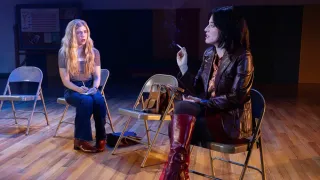September 5, 2019
Maurice Emmanuel Parent on SpeakEasy Stage's Production of 'Choir Boy'
Kilian Melloy READ TIME: 12 MIN.
With the Oscar-winning film 2016 "Moonlight," playwright (and screenplay co-writer) Tarell Alvin McCraney explored how LGBTQ African Americans might find acceptance and love in the most unexpected of places - from a drug dealer, for instance. In his 2012 play "Choir Boy," which follows a gay Black youth named Pharus for a year as he goes about his studies and his work as the head of the choir at a prestigious all-male school, McCraney plumbs similar depths in a very different setting.
Pharus is smart and feisty, but extremely lonely. Navigating the twin perils of homophobia and adolescence, he finds himself locked in a perpetual struggle against his chief nemesis, Bobby - who one suspects he might also have a crush on - even as he's forever engaged in a battle of wits with the school's staff, including the headmaster and an older instructor who has come out of retirement to teach.
But Pharus also has allies, both in the music that he excels at, and which offers him solace and feeds his ambitions and in the person of his roommate, AJ, who is not at all worried about sharing space with a gay fellow student.
It seemed more than a little freighted with meaning that EDGE and director Maurice Emmanuel Parent ended up discussing a play of such specific intersectionalities on the same day as Boston's "Straight Pride" parade, an event seemingly intended to mirror and mock the city's annual LGBTQ Pride events but which, in the event, proved nothing more than a barely-disguised Trump rally. (The fact that the event organizers have been tied to white supremacist extremist groups means that the event's true nature could hardly have been a surprise.)
Parent, who originally hails from Washington, D.C., has long been a force in Boston's theater scene, especially when it comes to musicals. A founding member of the Front Porch Arts Collective, the city's premier theater company focused on the experience and voices of the African diaspora, Parent was as keenly aware of the day's event as he was of the nuances and levels of meaning in the play under discussion. The conversation, naturally, took some political turns. But when times are trying, we turn to Art. As Parent told EDGE, this play - like any work that blends theater, music, and dance - is apt to have the power to reach audiences where they live: The heart, the mind, the spirit.
EDGE: So what's up with the 'Straight Pride' March today? Are you going?
Maurice Emmanuel Parent: I was going to go to the counter-protest, but we have rehearsal. I cannot believe that this thing is happening! There was a Facebook group invite to join the counter-protest and they likened it to when that group of white supremacists came to the Common after Charlottesville. I was in rehearsal that day as well, but I looked out the window and the counter-protestors were from the Common all the way down Tremont. I think maybe only 15 people showed up for the so-called White Activist group. So, I'm hoping something like that will happen, where there are hundreds more counter-protestors for every rabble-rouser.
EDGE: Given that it's Boston, that's probably going to be the case.
Maurice Emmanuel Parent: Yeah, we'll see!
EDGE: How's it going with Front Porch Arts Collective?
Maurice Emmanuel Parent: It's going really well! Thank you for asking. We're about to launch our second season. We're doing four co-productions this season, and we're starting the season off with a benefit reading of "Jitney" with John Douglas Thompson. He's reprising the role that earned him a Tony nomination. He and I met in Boston when he was in town for "Man in the Ring" at the Huntington, and I told him about the company. He said, "I will come up and do a benefit performance to help raise money for you all." So we're doing that on September 16th. The Huntington is sponsoring us as well as our fiscal sponsors Central Square Theatre. We're very excited for the event.
EDGE: You had your professional directorial debut last fall with Front Porch's production of "Breath and Imagination," which was also a play with music. Did that directorial assignment open the door in some ways to this one?
Maurice Emmanuel Parent: I think that it did open up a door for the possibility of me directing "Choir Boy." Paul Daigneault was aware of how well "Breath & Imagination" went, and he and I have collaborated many times over the years.
EDGE: Are you finding "Choir Boy" has some resonances with "Breath & Imagination?"
Maurice Emmanuel Parent: The main resonances are the use of spirituals and Gospel music. There's actually one song that is in both plays. Originally it was called "Keep Your Hand on the Plough," but in the '60s it was changed to "Keep Your Eyes on the Prize," but it's the same melody. In "Breath & Imagination" it was "Keep Your Hand on the Plough," and in "Choir Boy" it's "Keep Your Eyes on the Prize," but it's all about struggling through adversity to reach your goal. I think it's both playwrights' use of spirituals and Gospel songs that are known in the Black community, particularly in the Black church, but using them for dramatic purposes depending on the moment in the scene that calls for the message of that song that is the biggest similarity between the two pieces.
EDGE: Playwright Tarell Alvin McCraney has written the script for "Choir Boy" almost like a blank verse poem. How are you and the cast translating that texture and rhythm of his written language to the stage?
Maurice Emmanuel Parent: Yeah, he's very rhythmic in his writing. For me, it speaks to how the rhythm of his writing goes into the rhythm of a song because it's all a capella music. It's like the rhythm the individual – the rhythm of the heartbeat in the language, and in the rhythm of the singing. And then there's also step [that is incorporated into the play's performance], which is another percussive, rhythmic, body-based way of making music. To me, it speaks to how he's woven the music and the a capella singing. The step was added for the Broadway version, and we're staying with that tradition. [It's about] how all of these rhythms can meld together to tell a story.
EDGE: As with McCraney's play "In Moonlight Black Boys Look Blue" – which was adapted into the movie "Moonlight," which he also co-wrote – McCraney is exploring LGBTQ issues in the context of the African American community, and as with "Moonlight" he's showing here that the subject is not as cut and dried as might generally be believed. What conversations are you and the cast having around that?
Maurice Emmanuel Parent: Oh, we're having wonderful conversations. First of all, we discuss any way that any cast members personally relate to scenes in the play, and it's also... it's a few things. The main character, Pharus hasn't got passing privilege. He can't walk into a room and not have most people look at him and see that he is queer. So I think it's nice to have a protagonist who is like that.
I don't know who I am going to vote for in the Democratic primary, but I'm certainly glad someone like Pete Buttigieg, who is an out and proud gay man, is running. But he also benefits from passing privilege; if he didn't say he was gay, people wouldn't know. I think that's an issue that's at the center of "Choir Boy." What does it mean to be a Black man? What elements of society and culture define what a Black man is, and what happens if you are a Black man but you're outside of those definitions? What struggles do you come up against? But the main thing is, we can pinpoint the toxic masculinity of the play, but I don't want to judge it. There's a reason why Black communities and safe places that are Black focused do have such strong senses of masculinity. It's because throughout our history there have been programs and systems in place to dismantle Black masculinity, to dismantle the Black family, and to dismantle the Black community. A lot of this strong black masculine identity was forged in response to that oppression. I understand why people are so adamant about what it is to be a Black man because you had to do that to survive. However, those who sit outside that narrative place that struggles on its head.
EDGE: You mentioned passing a moment ago. There are at least two characters who seem like they might also be gay, or possibly bi – or maybe they're young and haven't yet ossified into some kind of straight macho persona.
Maurice Emmanuel Parent: I think the play does a great job of depicting how a lot of people that age operate. They don't know what they are; they know what excites them; they know what turns them on; they know what they like and what they don't like, and they know what they're curious about. No one in the play calls themselves queer or gay, but maybe they function in that manner. And there's one character who – I mean, I leave the character to the actors' interpretations, and we've talked about it, but there's one character, AJ – he's Pharus' roommate [played by Jaimar Brown] – is that one of the people you're talking about?
EDGE: Yes, definitely.
Maurice Emmanuel Parent: For me, I think it's bolder... I think it's more dangerous to be truly intimate with a person that society told you as you were growing up is "wrong" and is "bad" and will "ensnare" you – all the stuff people say about homosexuals in certain communities. [It's bold] to go above that and say, "I love this person, this person is in need, and I'm gonna comfort them because they are suffering." I think that's more dangerous than to have a quick sexual experience. I think for humanity, in general, it's riskier to be there, to be emotionally and physically and spiritually present for someone, and it not be sexual.
For me, AJ is this dream straight ally. He's like what every gay or queer Black boy would love to have as an older brother or close friend. And he grows throughout the play; he's confronted with things that make him uncomfortable, then he realizes that he cares for Pharus and he unpacks whatever feelings he has about whatever just happened [at different points in the play], whatever came up, and he learns from that and moves on. He's the character who changes most in the play. I love the actor's interpretation, and personally, I like to go with the idea that he's straight, however some audience members may walk away with a different opinion and that's fine, it's the beauty of theatre!
EDGE: I like that too; AJ does remind me of close friends I've had who were straight and very comfortable with themselves and not at all worried about having a gay friend. They weren't worried about it in themselves and so they didn't worry about it in others, either.
Maurice Emmanuel Parent: Exactly. That's the best ally you can have on the front lines with you, fighting those battles. We were talking about the counter-protest happening today; it's not gonna be all gay people, just like the counter-protestors at that earlier white nationalist gathering on the Common were not all people of color. There were many, many people of color, but there were also many allies that were willing to be on the front lines. Many of my straight colleagues and friends are planning to be at the counter-protest today. They are true allies.
EDGE: Pharus is a complex creation, but it's hard to tell sometimes whether he's a cynical manipulator or if he's just a kid who's smarter than everyone around him, including the adults, but he's not yet mature enough to know how to handle that.
Maurice Emmanuel Parent: For me, he's a mix of both. I think he doesn't want to be ridiculed; he's trying his best to navigate the society and a culture that he's a part of. He has to be quick, he has to come up with quick responses because he's always a target. He wasn't given the space even to decide what he is. In the play he says, "Why am I being ridiculed for being gay when I haven't even claimed that for myself?" I'm paraphrasing; it's said much more eloquently in the play. But he hasn't claimed that he's a gay man. He's just Pharus. He is who is he, and people look at him and label him and then judge him for those labels. How does he navigate that terrain? You have to be smart; you have to be a step ahead of other people to survive. Pharus is extremely intelligent; he can be a little manipulative, but it's for survival purposes. He's surrounded by people who don't want to give him the advantages he rightfully deserves. Well, not entirely; he does have some advocates.
EDGE: Pharus is played by Isaiah Reynolds. Assuming you participated in the casting decisions, what did Mr. Reynolds bring to the role that won him the part?
Maurice Emmanuel Parent: I was very involved in the casting process, and Isaiah Reynolds brought everything. He's such a beautiful actor, a beautiful singer and dancer. We had some wonderful candidates for Pharus, but we didn't have anybody else that brings the combination of skills that Isaiah brings to the table, and at such a high level. The play requires the actor to be firing on all cylinders like he is.
EDGE: There are several talkbacks scheduled for the show, on Sept. 22, Sept, 29, and Oct. 6. What are you hoping for and looking for when you have those conversations with the audience?
Maurice Emmanuel Parent: Oh, that's a great question... I love to go in without having any expectations. I know the talkbacks may have titles, so I will try to wrap my brain around the title or the theme, but I love to see what people pull out of the piece based off their own experience, or questions they have about the process. I know Boston has its issues, but there are certain privileges that the gay/trans/queer community are afforded in a place like Boston. I love living here, and I love the life I can live here. But it's interesting to have those conversations in a place that is a blue state and city, and especially in an area like the South End that has a such a strong queer presence. Can we have a conversation around the different experiences that are within the queer community? What is it to be a person of color who is queer? And then we can direct the question to other groups that feel marginalized within the queer community, and the nuances of their experiences – maybe. But, again, I don't go into it with too many expectations. I love to see what people respond to.
We could have a cool conversation around step, because step is used throughout the show, it's used very specifically. We could have conversations about gay men, about step, about the church, about Black men, White allies – there are so many things we could talk about.
EDGE: This is just the start of a new theater season. What else have you got coming up?
Maurice Emmanuel Parent: I just started full time at Tufts University as a Professor of the Practice in the Theatre Department. I'm a professor now!
[Laughter]
EDGE: Congratulations!
Maurice Emmanuel Parent: Thank you, thank you! My mom is Black American, my dad is Haitian American, and they gave me a lovely life and they worked hard, but they had to provide that life without college degrees. I'm actually the first in my immediate family to get a college degree after high school, and definitely the first to get a master's. So to go from that to being a professor – they're both just very proud. I can't wait to show them my office. It's small, but it's mine!
[Laughter]
Maurice Emmanuel Parent: I'll start that in the Fall. And I don't think it's been announced yet, but I'm going to be in "Sweat" at the Huntington, as an actor. That's something I love about the city, too – I get to be both a director and an actor! I'll be acting in "Sweat," then I'll be directing, at Suffolk University, the musical "Violet." Then I'm going to direct for Nora Theatre at Central Square for a Front Porch co-production of "Ain't Misbehavin'."
So, to your point from earlier – more musicals and plays with music.
EDGE: You seem very at home there.
Maurice Emmanuel Parent: I love it! I love directing and performing musical theater. I mean, I teach it; I teach it with Matt Stern at BU, I taught it at Northeastern, I taught a class on musical theater at Boston College. I love it when you add music and rhythm and dance to your storytelling. You're affecting the audience on so many different levels. I feel that your brain hears music different from how it hears text, different from how it sees movement; in this form you get to play with all of that to make these stories.
I love plays with music: Bring them on!
The SpeakEasy Stage Company production of "Choir Boy" runs from September 13 – October 12 at the Boston Center for the Arts. For tickets and more information, please go to https://www.speakeasystage.com/choir-boy/






